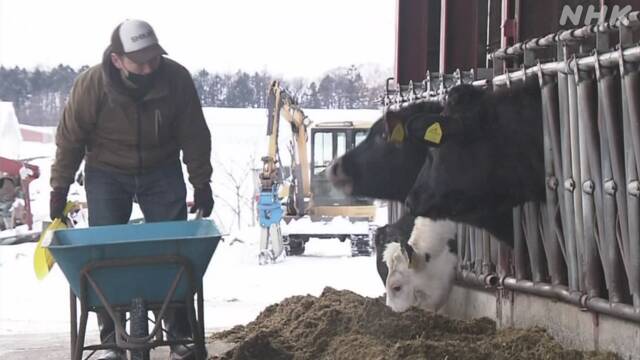There are concerns that the effects of the situation in Ukraine will spread to Japanese dairy.
Due to the turmoil in Ukraine, one of the world's leading grain exporters, international prices for prey corn are on the rise, raising concerns among dairy farmers that the costs will increase further.
International prices for livestock feed and feed corn, which rely on imports from overseas, have remained high since the beginning of the year due to rising demand in China and poor crops in South America.
Under these circumstances, a sense of caution that supply from Ukraine, one of the world's leading exporters, may be stagnant is a new factor that further raises international prices.
Mr. Uchikaihei, who raises 130 cows in Shikaoi-cho, Hokkaido, said, "As long as we rely on overseas grains, we cannot help being affected by foreign emergencies, but while feed prices have been rising all the time, It's a situation like a catch-up, "he says.
At Utsumi-san's ranch, food prices have risen by up to 30% over the last year, resulting in a cost increase of nearly 4 million yen, which is a heavy burden on management.
Mr. Utsumi says that although he mixes some of the corn that he cultivated himself in order to keep costs down, it is difficult to take any further measures because changing the contents of the feed will affect the health of the cows. ..
As the demand for raw milk is declining due to the effects of the new coronavirus, dairy farmers in Hokkaido are forced to curb production for the first time in 16 years from the new fiscal year, making it difficult to increase sales.
Mr. Utsumi said, "Don't squeeze too much, the price of raw milk will be cheaper, but the ingredients are expensive." I hope you can think about it a little. "
JA Zen-Noh "Price rises due to invasion of Ukraine"
Mr. Ichiro Samejima of the Grain Foreign Exchange Division, who is in charge of purchasing corn at JA Zen-Noh = National Federation of Agricultural Cooperatives, said, "The unrest in Ukraine has caused concerns about supply restrictions and contributed to the rise in corn market prices. I have. "
According to Mr. Samejima, the price of corn futures on the Chicago Board of Trade in the United States, which is an international index for grain trading, has continued to rise since the beginning of the year.
The main causes are the sharp increase in imports from China and the poor harvest of corn due to bad weather in South America.
Under these circumstances, it is analyzed that the unrest in Ukraine, which is one of the world's leading producers of corn, has been added as a new factor for the rise in prices.
Mr. Samejima said, "At the time of the annexation of the Crimean Peninsula in 2014, concerns about supply restrictions from Ukraine caused the corn market to rise," said Russia unilaterally in 2014, eight years ago. He points out that the annexation of Crimea in southern Ukraine also saw an increase in international prices.
Japan mainly imports corn from the United States.
Regarding the impact of Russia's invasion of Ukraine, Mr. Samejima said, "If exports from Ukraine are restricted or completely stopped, the demand will be added to other exporting countries such as the United States, and grain. It will be a factor to raise the market price, "he said, raising concerns about the possibility that import prices will rise for Japan due to the global increase in demand from the United States.
Ukraine is "European Granary"
Ukraine has a fertile black land zone and is one of the world's leading grain exporters, also known as the "European Granary", where agricultural land occupies about 70% of the country's land.
According to the U.S. Department of Agriculture, Ukraine's grain exports from 2020 to 2021 are
▽ corn, which is the fourth largest in the world, at more than 23 million tons, and
▽ wheat, which is the sixth largest in the world, at more than 16 million tons. It also has a great influence on the market price.
Japan relies on imports of nearly 90% of feed corn from overseas, and fluctuations in international corn prices are a problem for Japanese dairy farmers that are directly linked to feed costs.

